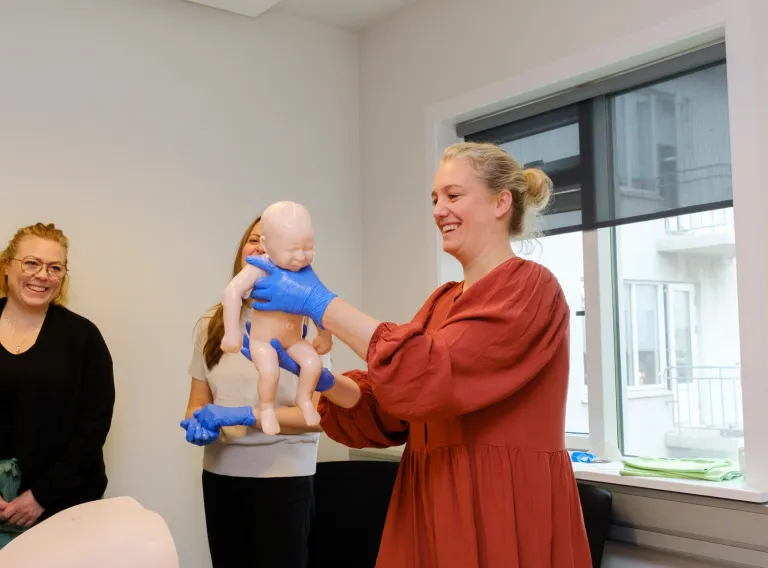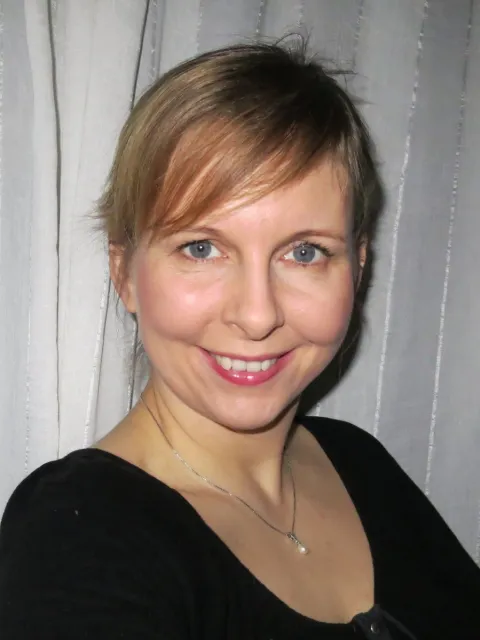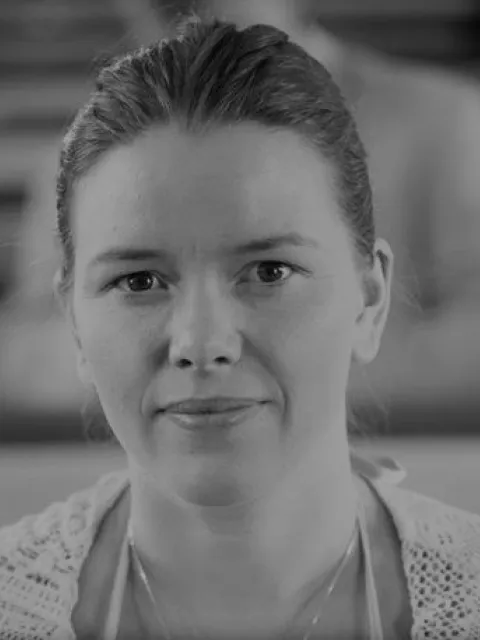

- Do you want professional recognition as a biomedical scientist?
- Are you interested in working as part of a research team?
- Do you want to work in scientific and contract research?
- Are you interested in completing a diploma?
The MS in midwifery is specially designed for students who have completed a Candidate's degree in midwifery from UI. Applicants who have not completed a Candidate's degree should apply for the programme in midwifery with professional recognition.
Students take mandatory courses in statistics, qualitative and quantitative methodology as well as completing a final project.
Students receive training in scientific working methods and complete their own research project, research report and journal article. Midwifery is a very active area of research and students will have opportunities to connect with the international scientific community.
Full-time students can complete the programme in one and a half years, but part-time study alongside employment is common.
Programme structure
Students may transfer 42 ECTS from their Candidate's degree and 30 from their BS degree in nursing.
This means that students only need to complete 48 additional ECTS for the Master's degree. The programme should not take longer than two years.
The programme is made up of:
- Mandatory courses, 18 ECTS
- Final project, 30 ECTS
- Elective courses (optional)
Main focuses
- Methodology
- Applied statistics
- Seminars
Organisation of teaching
This programme is taught in Icelandic and most textbooks are in English.
Mandatory courses are taught on one full day every other week for six weeks. Attendance is required for most mandatory courses.
Students are also required to attend research seminars, for which no credits are awarded. Master's students must take part in at least 10 seminars to graduate.
Main objectives
The programme is designed to provide students with opportunities to enhance their knowledge of a specific area of midwifery
The focus on research and academic debate trains students to take part in critical discussions and evaluate topics for themselves. This leaves students better equipped to work as specialists in their chosen field.
Other
Completing the programme allows a student to apply for doctoral studies.
Candidata Obstetriciorum
60 ECTS must be completed for a Master's level certificate in Biomedical Science. The programme is structured so that it can be completed in one academic year, and the maximum time limit for completion is two years.
- CV
- Statement of purpose
- Reference 1, Name and email
- Reference 2, Name and email
- Certified copies of diplomas and transcripts
- License
- Supporting documents for an online application(Icelandic only)
- Statement on interests and goals(Icelandic only)
Further information on supporting documents can be found here
Programme structure
Check below to see how the programme is structured.
This programme does not offer specialisations.
- First year
- Fall
- Applied statistics
- Research seminar
- Spring 1
- Quantitative Nursing Research
- Qualitative Nursing Research
- Research seminar
Applied statistics (HJÚ135F)
This is the second course in applied statistics, focusing on calculation, interpretation, and presentation of results. Topics include mean and frequency-based tests of significance, alternative measures of correlation, simple/oneway and multivariate ANOVA and Regression, and statistical measures of reliability and validity of variables and instruments.
The course is composed of lectures and problem-based sessions. It is given in the classroom.
Research seminar (HJÚ0AIF)
The main emphasis is on providing the students with the opportunity to present their research proposals and participate in critical discussions about the relevance, methods and other aspects of the research process. Each student has to present his research proposal once and be the "main opponent" in the presentation of at least one other student.
Participation in the master's seminar is mandatory for finishing the final master's thesis and the aim is to guide and support students in completing their thesis. The aim of the seminar is to train the students in critical discussion and presentation of their thesis. At the beginning of each semester, all students receive an announcement of when the seminars are planned and how they will be scheduled that semester. A seminar is intended for all masters’ students during the whole study period. It is therefore recommended for students to start attending as soon as possible. The student must attend 10 seminars before the final project is evaluated.
Quantitative Nursing Research (HJÚ252F)
The course is intended to deepen students' knowledge in practical quantitative methodology.
The course will be presented scientific methodology with particular emphasis on the systematic literature review that is the cornerstone of evidence-based practice. In addition, the study of tailored procedures used in clinical trials in Health discussed and analyzed.
The systematic theoretical summary of field training to set out a clear research question or research questions and to make use of PICO criteria to assemble a search with keywords from the research question/categories. In addition, emphasis will be placed on guided by the PRISMA statement on how to levy the results of a systematic literature review to identify, select and criticize the relevant studies and to collect and analyze studies that meet the entry requirements for academic SPC.
Students are trained to assess the quality of research, among others from the Joanna Briggs Institute manual.
The course will place special emphasis on introducing students to the cross-sectional studies, long-term research and development of standard and semi-standard experimental research.
In the treatment studies, among other things, deals with the coordination of research subjects and the research questions and hypotheses to the methodology relied upon, ie, the sample size, format, measurement, data processing and effect size (effect size).
Special emphasis is placed on providing students with insight into the requirements for your creative research results in international journals and the exploitation of nursing and midwifery.
Qualitative Nursing Research (HJÚ253F)
The course is intended to deepen students' knowledge in qualitative methodology. The philosophical and theoretical basis of qualitative methods is taught alongside its practical application in nursing and midwifery. In this context, students develop skills to develop initiate their own research projects and to utilize research results within their own field of expertise.
The student brings interesting research articles conducted within his/her speciality to class and they are used in wider discussions of qualitative methodology.
To prepare the student to conduct qualitative studies we have organized interactive workshops. Throughout the course, ethical issues related to qualitative research are also discussed, such as confidentiality, validity and generalization of research results.
The student is also trained to critically appraise the quality of published qualitative research articles. Particular emphasis is placed on getting the student acquainted with phenomenology, qualitative content analysis (theme analysis vs. coding and deductive vs. inductive analysis), field studies (ethnography), individual interviews and focus group interviews, mixed-method research, and action research.
Projects that the student engage in during the course should be associated with their own field of expertise and must be prepared in collaboration with their main supervisor.
Research seminar (HJÚ0AIF)
The main emphasis is on providing the students with the opportunity to present their research proposals and participate in critical discussions about the relevance, methods and other aspects of the research process. Each student has to present his research proposal once and be the "main opponent" in the presentation of at least one other student.
Participation in the master's seminar is mandatory for finishing the final master's thesis and the aim is to guide and support students in completing their thesis. The aim of the seminar is to train the students in critical discussion and presentation of their thesis. At the beginning of each semester, all students receive an announcement of when the seminars are planned and how they will be scheduled that semester. A seminar is intended for all masters’ students during the whole study period. It is therefore recommended for students to start attending as soon as possible. The student must attend 10 seminars before the final project is evaluated.
- Second year
- Fall
- Research seminar
- Final project
- Spring 1
- Final project
- Research seminar
Research seminar (HJÚ0AIF)
The main emphasis is on providing the students with the opportunity to present their research proposals and participate in critical discussions about the relevance, methods and other aspects of the research process. Each student has to present his research proposal once and be the "main opponent" in the presentation of at least one other student.
Participation in the master's seminar is mandatory for finishing the final master's thesis and the aim is to guide and support students in completing their thesis. The aim of the seminar is to train the students in critical discussion and presentation of their thesis. At the beginning of each semester, all students receive an announcement of when the seminars are planned and how they will be scheduled that semester. A seminar is intended for all masters’ students during the whole study period. It is therefore recommended for students to start attending as soon as possible. The student must attend 10 seminars before the final project is evaluated.
Final project (LJÓ442L)
Final project
Final project (LJÓ442L)
Final project
Research seminar (HJÚ0AIF)
The main emphasis is on providing the students with the opportunity to present their research proposals and participate in critical discussions about the relevance, methods and other aspects of the research process. Each student has to present his research proposal once and be the "main opponent" in the presentation of at least one other student.
Participation in the master's seminar is mandatory for finishing the final master's thesis and the aim is to guide and support students in completing their thesis. The aim of the seminar is to train the students in critical discussion and presentation of their thesis. At the beginning of each semester, all students receive an announcement of when the seminars are planned and how they will be scheduled that semester. A seminar is intended for all masters’ students during the whole study period. It is therefore recommended for students to start attending as soon as possible. The student must attend 10 seminars before the final project is evaluated.
- Fall
- HJÚ135FApplied statisticsMandatory (required) course6A mandatory (required) course for the programme6 ECTS, creditsCourse Description
This is the second course in applied statistics, focusing on calculation, interpretation, and presentation of results. Topics include mean and frequency-based tests of significance, alternative measures of correlation, simple/oneway and multivariate ANOVA and Regression, and statistical measures of reliability and validity of variables and instruments.
The course is composed of lectures and problem-based sessions. It is given in the classroom.
Distance learningPrerequisitesHJÚ0AIFResearch seminarMandatory (required) course0A mandatory (required) course for the programme0 ECTS, creditsCourse DescriptionThe main emphasis is on providing the students with the opportunity to present their research proposals and participate in critical discussions about the relevance, methods and other aspects of the research process. Each student has to present his research proposal once and be the "main opponent" in the presentation of at least one other student.
Participation in the master's seminar is mandatory for finishing the final master's thesis and the aim is to guide and support students in completing their thesis. The aim of the seminar is to train the students in critical discussion and presentation of their thesis. At the beginning of each semester, all students receive an announcement of when the seminars are planned and how they will be scheduled that semester. A seminar is intended for all masters’ students during the whole study period. It is therefore recommended for students to start attending as soon as possible. The student must attend 10 seminars before the final project is evaluated.
Face-to-face learningPrerequisites- Spring 2
HJÚ252FQuantitative Nursing ResearchMandatory (required) course6A mandatory (required) course for the programme6 ECTS, creditsCourse DescriptionThe course is intended to deepen students' knowledge in practical quantitative methodology.
The course will be presented scientific methodology with particular emphasis on the systematic literature review that is the cornerstone of evidence-based practice. In addition, the study of tailored procedures used in clinical trials in Health discussed and analyzed.
The systematic theoretical summary of field training to set out a clear research question or research questions and to make use of PICO criteria to assemble a search with keywords from the research question/categories. In addition, emphasis will be placed on guided by the PRISMA statement on how to levy the results of a systematic literature review to identify, select and criticize the relevant studies and to collect and analyze studies that meet the entry requirements for academic SPC.
Students are trained to assess the quality of research, among others from the Joanna Briggs Institute manual.
The course will place special emphasis on introducing students to the cross-sectional studies, long-term research and development of standard and semi-standard experimental research.
In the treatment studies, among other things, deals with the coordination of research subjects and the research questions and hypotheses to the methodology relied upon, ie, the sample size, format, measurement, data processing and effect size (effect size).
Special emphasis is placed on providing students with insight into the requirements for your creative research results in international journals and the exploitation of nursing and midwifery.
Distance learningThe course is taught if the specified conditions are metPrerequisitesAttendance required in classHJÚ253FQualitative Nursing ResearchMandatory (required) course6A mandatory (required) course for the programme6 ECTS, creditsCourse DescriptionThe course is intended to deepen students' knowledge in qualitative methodology. The philosophical and theoretical basis of qualitative methods is taught alongside its practical application in nursing and midwifery. In this context, students develop skills to develop initiate their own research projects and to utilize research results within their own field of expertise.
The student brings interesting research articles conducted within his/her speciality to class and they are used in wider discussions of qualitative methodology.
To prepare the student to conduct qualitative studies we have organized interactive workshops. Throughout the course, ethical issues related to qualitative research are also discussed, such as confidentiality, validity and generalization of research results.
The student is also trained to critically appraise the quality of published qualitative research articles. Particular emphasis is placed on getting the student acquainted with phenomenology, qualitative content analysis (theme analysis vs. coding and deductive vs. inductive analysis), field studies (ethnography), individual interviews and focus group interviews, mixed-method research, and action research.
Projects that the student engage in during the course should be associated with their own field of expertise and must be prepared in collaboration with their main supervisor.
Distance learningThe course is taught if the specified conditions are metPrerequisitesAttendance required in classHJÚ0AIFResearch seminarMandatory (required) course0A mandatory (required) course for the programme0 ECTS, creditsCourse DescriptionThe main emphasis is on providing the students with the opportunity to present their research proposals and participate in critical discussions about the relevance, methods and other aspects of the research process. Each student has to present his research proposal once and be the "main opponent" in the presentation of at least one other student.
Participation in the master's seminar is mandatory for finishing the final master's thesis and the aim is to guide and support students in completing their thesis. The aim of the seminar is to train the students in critical discussion and presentation of their thesis. At the beginning of each semester, all students receive an announcement of when the seminars are planned and how they will be scheduled that semester. A seminar is intended for all masters’ students during the whole study period. It is therefore recommended for students to start attending as soon as possible. The student must attend 10 seminars before the final project is evaluated.
Face-to-face learningPrerequisites- Fall
- HJÚ0AIFResearch seminarMandatory (required) course0A mandatory (required) course for the programme0 ECTS, creditsCourse Description
The main emphasis is on providing the students with the opportunity to present their research proposals and participate in critical discussions about the relevance, methods and other aspects of the research process. Each student has to present his research proposal once and be the "main opponent" in the presentation of at least one other student.
Participation in the master's seminar is mandatory for finishing the final master's thesis and the aim is to guide and support students in completing their thesis. The aim of the seminar is to train the students in critical discussion and presentation of their thesis. At the beginning of each semester, all students receive an announcement of when the seminars are planned and how they will be scheduled that semester. A seminar is intended for all masters’ students during the whole study period. It is therefore recommended for students to start attending as soon as possible. The student must attend 10 seminars before the final project is evaluated.
Face-to-face learningPrerequisitesLJÓ442LFinal projectMandatory (required) course0A mandatory (required) course for the programme0 ECTS, creditsCourse DescriptionFinal project
PrerequisitesPart of the total project/thesis credits- Spring 2
LJÓ442LFinal projectMandatory (required) course0A mandatory (required) course for the programme0 ECTS, creditsCourse DescriptionFinal project
PrerequisitesPart of the total project/thesis creditsHJÚ0AIFResearch seminarMandatory (required) course0A mandatory (required) course for the programme0 ECTS, creditsCourse DescriptionThe main emphasis is on providing the students with the opportunity to present their research proposals and participate in critical discussions about the relevance, methods and other aspects of the research process. Each student has to present his research proposal once and be the "main opponent" in the presentation of at least one other student.
Participation in the master's seminar is mandatory for finishing the final master's thesis and the aim is to guide and support students in completing their thesis. The aim of the seminar is to train the students in critical discussion and presentation of their thesis. At the beginning of each semester, all students receive an announcement of when the seminars are planned and how they will be scheduled that semester. A seminar is intended for all masters’ students during the whole study period. It is therefore recommended for students to start attending as soon as possible. The student must attend 10 seminars before the final project is evaluated.
Face-to-face learningPrerequisitesSecond year- Fall
- HJÚ135FApplied statisticsMandatory (required) course6A mandatory (required) course for the programme6 ECTS, creditsCourse Description
This is the second course in applied statistics, focusing on calculation, interpretation, and presentation of results. Topics include mean and frequency-based tests of significance, alternative measures of correlation, simple/oneway and multivariate ANOVA and Regression, and statistical measures of reliability and validity of variables and instruments.
The course is composed of lectures and problem-based sessions. It is given in the classroom.
Distance learningPrerequisitesHJÚ0AIFResearch seminarMandatory (required) course0A mandatory (required) course for the programme0 ECTS, creditsCourse DescriptionThe main emphasis is on providing the students with the opportunity to present their research proposals and participate in critical discussions about the relevance, methods and other aspects of the research process. Each student has to present his research proposal once and be the "main opponent" in the presentation of at least one other student.
Participation in the master's seminar is mandatory for finishing the final master's thesis and the aim is to guide and support students in completing their thesis. The aim of the seminar is to train the students in critical discussion and presentation of their thesis. At the beginning of each semester, all students receive an announcement of when the seminars are planned and how they will be scheduled that semester. A seminar is intended for all masters’ students during the whole study period. It is therefore recommended for students to start attending as soon as possible. The student must attend 10 seminars before the final project is evaluated.
Face-to-face learningPrerequisites- Spring 2
HJÚ252FQuantitative Nursing ResearchMandatory (required) course6A mandatory (required) course for the programme6 ECTS, creditsCourse DescriptionThe course is intended to deepen students' knowledge in practical quantitative methodology.
The course will be presented scientific methodology with particular emphasis on the systematic literature review that is the cornerstone of evidence-based practice. In addition, the study of tailored procedures used in clinical trials in Health discussed and analyzed.
The systematic theoretical summary of field training to set out a clear research question or research questions and to make use of PICO criteria to assemble a search with keywords from the research question/categories. In addition, emphasis will be placed on guided by the PRISMA statement on how to levy the results of a systematic literature review to identify, select and criticize the relevant studies and to collect and analyze studies that meet the entry requirements for academic SPC.
Students are trained to assess the quality of research, among others from the Joanna Briggs Institute manual.
The course will place special emphasis on introducing students to the cross-sectional studies, long-term research and development of standard and semi-standard experimental research.
In the treatment studies, among other things, deals with the coordination of research subjects and the research questions and hypotheses to the methodology relied upon, ie, the sample size, format, measurement, data processing and effect size (effect size).
Special emphasis is placed on providing students with insight into the requirements for your creative research results in international journals and the exploitation of nursing and midwifery.
Distance learningThe course is taught if the specified conditions are metPrerequisitesAttendance required in classHJÚ253FQualitative Nursing ResearchMandatory (required) course6A mandatory (required) course for the programme6 ECTS, creditsCourse DescriptionThe course is intended to deepen students' knowledge in qualitative methodology. The philosophical and theoretical basis of qualitative methods is taught alongside its practical application in nursing and midwifery. In this context, students develop skills to develop initiate their own research projects and to utilize research results within their own field of expertise.
The student brings interesting research articles conducted within his/her speciality to class and they are used in wider discussions of qualitative methodology.
To prepare the student to conduct qualitative studies we have organized interactive workshops. Throughout the course, ethical issues related to qualitative research are also discussed, such as confidentiality, validity and generalization of research results.
The student is also trained to critically appraise the quality of published qualitative research articles. Particular emphasis is placed on getting the student acquainted with phenomenology, qualitative content analysis (theme analysis vs. coding and deductive vs. inductive analysis), field studies (ethnography), individual interviews and focus group interviews, mixed-method research, and action research.
Projects that the student engage in during the course should be associated with their own field of expertise and must be prepared in collaboration with their main supervisor.
Distance learningThe course is taught if the specified conditions are metPrerequisitesAttendance required in classHJÚ0AIFResearch seminarMandatory (required) course0A mandatory (required) course for the programme0 ECTS, creditsCourse DescriptionThe main emphasis is on providing the students with the opportunity to present their research proposals and participate in critical discussions about the relevance, methods and other aspects of the research process. Each student has to present his research proposal once and be the "main opponent" in the presentation of at least one other student.
Participation in the master's seminar is mandatory for finishing the final master's thesis and the aim is to guide and support students in completing their thesis. The aim of the seminar is to train the students in critical discussion and presentation of their thesis. At the beginning of each semester, all students receive an announcement of when the seminars are planned and how they will be scheduled that semester. A seminar is intended for all masters’ students during the whole study period. It is therefore recommended for students to start attending as soon as possible. The student must attend 10 seminars before the final project is evaluated.
Face-to-face learningPrerequisites- Fall
- HJÚ0AIFResearch seminarMandatory (required) course0A mandatory (required) course for the programme0 ECTS, creditsCourse Description
The main emphasis is on providing the students with the opportunity to present their research proposals and participate in critical discussions about the relevance, methods and other aspects of the research process. Each student has to present his research proposal once and be the "main opponent" in the presentation of at least one other student.
Participation in the master's seminar is mandatory for finishing the final master's thesis and the aim is to guide and support students in completing their thesis. The aim of the seminar is to train the students in critical discussion and presentation of their thesis. At the beginning of each semester, all students receive an announcement of when the seminars are planned and how they will be scheduled that semester. A seminar is intended for all masters’ students during the whole study period. It is therefore recommended for students to start attending as soon as possible. The student must attend 10 seminars before the final project is evaluated.
Face-to-face learningPrerequisitesLJÓ442LFinal projectMandatory (required) course0A mandatory (required) course for the programme0 ECTS, creditsCourse DescriptionFinal project
PrerequisitesPart of the total project/thesis credits- Spring 2
LJÓ442LFinal projectMandatory (required) course0A mandatory (required) course for the programme0 ECTS, creditsCourse DescriptionFinal project
PrerequisitesPart of the total project/thesis creditsHJÚ0AIFResearch seminarMandatory (required) course0A mandatory (required) course for the programme0 ECTS, creditsCourse DescriptionThe main emphasis is on providing the students with the opportunity to present their research proposals and participate in critical discussions about the relevance, methods and other aspects of the research process. Each student has to present his research proposal once and be the "main opponent" in the presentation of at least one other student.
Participation in the master's seminar is mandatory for finishing the final master's thesis and the aim is to guide and support students in completing their thesis. The aim of the seminar is to train the students in critical discussion and presentation of their thesis. At the beginning of each semester, all students receive an announcement of when the seminars are planned and how they will be scheduled that semester. A seminar is intended for all masters’ students during the whole study period. It is therefore recommended for students to start attending as soon as possible. The student must attend 10 seminars before the final project is evaluated.
Face-to-face learningPrerequisites
Additional information The University of Iceland collaborates with over 400 universities worldwide. This provides a unique opportunity to pursue part of your studies at an international university thus gaining added experience and fresh insight into your field of study.
Students generally have the opportunity to join an exchange programme, internship, or summer courses. However, exchanges are always subject to faculty approval.
Students have the opportunity to have courses evaluated as part of their studies at the University of Iceland, so their stay does not have to affect the duration of their studies.
Midwifery is a varied career. Midwives work in prenatal care and diagnosis, birthing care, postnatal care and breastfeeding support, preventative healthcare and advice regarding gynaecology and sexual health.
Midwives work independently within and outside institutions. A qualification in midwifery can open up career opportunities abroad.
An education in this area can open up opportunities in:
- Hospitals
- Healthcare clinics
- The Icelandic Cancer Society
- Private companies
- Home visit services
- Teaching and research
This list is not exhaustive.
The student organisation Curator organises a busy social calendar at the Faculty of Nursing. Curator aims to promote fun, community and a positive atmosphere at the Faculty.
Curator organises events such as new student orientations, workplace tours, mystery trips, etc.
Students' comments  I chose midwifery due to the fascinating career opportunities. The programme is both theoretical and clinical, challenging but fun. The diverse career paths in midwifery were surprising. The small class size creates a tight-knit group, making the experience rewarding.
I chose midwifery due to the fascinating career opportunities. The programme is both theoretical and clinical, challenging but fun. The diverse career paths in midwifery were surprising. The small class size creates a tight-knit group, making the experience rewarding. I had dreamed of becoming a midwife for years before finally taking the leap and applying. I have no regrets. The education is engaging, and our cohort has formed strong friendships. Much of the learning is hands-on, and accompanying women and their families through childbirth has been both challenging and profoundly fulfilling. Midwifery is more diverse than I initially thought.
I had dreamed of becoming a midwife for years before finally taking the leap and applying. I have no regrets. The education is engaging, and our cohort has formed strong friendships. Much of the learning is hands-on, and accompanying women and their families through childbirth has been both challenging and profoundly fulfilling. Midwifery is more diverse than I initially thought. Being a midwifery student demands dedication, interest in individuals, and professional insight. It's a rewarding journey, providing opportunities to support clients throughout the childbirth process. The practical nature of the programme and the small, close-knit classes are highlights.
Being a midwifery student demands dedication, interest in individuals, and professional insight. It's a rewarding journey, providing opportunities to support clients throughout the childbirth process. The practical nature of the programme and the small, close-knit classes are highlights. Midwifery studies are enriching and form close-knit friendships. The diverse, independent work of midwives is fascinating. The challenging yet enjoyable programme combines academic knowledge with human insight, enhancing daily learning.
Midwifery studies are enriching and form close-knit friendships. The diverse, independent work of midwives is fascinating. The challenging yet enjoyable programme combines academic knowledge with human insight, enhancing daily learning.Helpful content Study wheel
What interests you?
How to apply
Follow the path
Contact us If you still have questions, feel free to contact us.
Faculty of Nursing and MidwiferyWeekdays 9 am-12 pm and 1-3 pmGeneral ServiceThe Service Desk is a point of access for all services. You can drop in at the University Centre or use the WebChat at the bottom right of this page.

Share